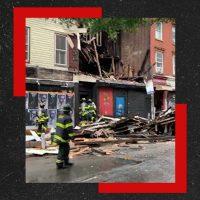The impact of the fatal garage collapse at 57 Ann Street will extend beyond the human tragedy and property damage, industry insiders say.
Insurance costs at garages could soon increase, forcing operators to raise parking prices and buildings with garages to hike maintenance fees — exacerbating a trend that started last summer when two major insurance programs pulled out of the local market.
“The premiums are astronomical”
“People who have been in real estate insurance for 40 years have never seen a market like this,” said Brian Boak, director of risk management at Akam Property Management Services, one of the city’s largest property management companies.
The Department of Buildings last year took steps to avoid a tragedy like the one April 18 on Ann Street, which caused one death and several injuries. In January 2022 the agency adopted an inspection model that gives garages code-compliance deadlines based on which community district they are in.
The first group of districts — which includes FiDi — has to be compliant by the end of the year. It’s a step up from a catch-all rule that required building owners to maintain their buildings.
“It wasn’t the Wild West before,” said Chris Alker, Akam’s VP of building operations and compliance. “[But] there are some parties who are not doing preventative maintenance and so the law has noticed that’s the case.”
It’s unclear what role a lack of preventative maintenance played in the Ann Street collapse. The garage had four open violations, at least one of which suggested the structure’s integrity may have been compromised.
The collapse will not necessarily speed up inspections, as the Department of Buildings’ website lists only 50 qualified parking structure inspectors for over 2,500 garages citywide. A spokesperson for the agency did not respond to a request for comment.
It is possible that the Ann Street garage was overloaded and that the code violations didn’t contribute to the collapse. But if they did, it could make finding affordable insurance even harder for co-op and condo boards.
Insurance costs at residential buildings have been rising since last summer, when two major umbrella insurance programs in New York City ended. Umbrella insurance protects buildings from expensive, safety-related issues by layering policies from several different firms, allowing a building to get nine-figure coverage for a reasonable price.
But last summer, Metropolitan Commercial Real Estate and Vanderbilt Properties Associates abruptly withdrew from the local umbrella market, citing rising costs. They were often the first layers on a layered policy, and their departures led to other insurers following suit.
Insurance premiums would have risen from inflation anyway, Boak said, but the loss of those two umbrellas caused havoc for condo and co-op boards.
“The capacity to write umbrellas vanished overnight,” said Boak. “These umbrella quotes are coming in at literally the last second. The premiums are astronomical.”
One building Akam manages is now paying $175,000 for $10 million in coverage. It used to pay $30,000 for a nearly $100 million policy.
“If the cost of insuring a building goes up, maintenance cost goes up,” Boak said. “That I know for a fact.”
Read more


